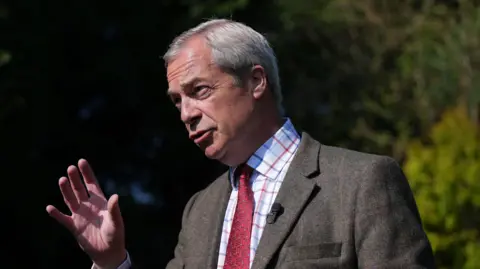Farage rejects local Reform UK-Tory coalitions
 PA Media
PA MediaNigel Farage has dismissed a suggestion from Kemi Badenoch that Reform UK and Tory councillors could enter into coalitions after next month's local elections.
Speaking earlier, Tory leader Badenoch told the BBC her party's local leaders would be free to share power with Reform if it was required to keep councils running.
But Farage later appeared to brush off the idea, saying Reform UK had "no intention in forming coalitions with the Tories at any level".
He has however left the door open to more informal co-operation, telling the BBC on Wednesday there could be "working relationships" with other parties.
It is not uncommon for different parties to share power locally, with the number of councils not controlled by a single party rising in recent years.
Reform currently holds around 100 council seats, mainly as a result of defections from other parties, but is looking to boost its representation in elections for a clutch of largely rural and suburban council seats in England on 1 May.
The party stood in only 12% of available council seats in local elections last year, but is contesting nearly all the 1,600 council seats up for re-election next month.
Farage has previously said his party is aiming to win hundreds of seats, in a bid to boost its national election chances by gaining a bigger foothold in town halls.
Badenoch has ruled out an electoral pact with Reform on a national level, arguing that Farage is trying to destroy the Conservatives as a party.
But she has faced increasing questions in recent days about whether her party's councillors would be allowed to do deals with Reform UK to govern locally.
'Broke Britain'
Asked earlier whether she could rule out local deals, Badenoch told BBC Breakfast Tory councillors would have to "make the choice about what is right for their councils" after the elections next month.
She pointed out that Tories were already governing locally as part of "various coalitions" with other parties, including Labour and the Liberal Democrats, as well as independent councillors.
"Local leaders need to decide what to do to run their councils," she said, adding: "People expect their local leaders to deliver."
She did not specify whether this applied only to formal arrangements for sharing power, or more informal deals where parties could agree to co-operate on particular policy areas or budget-setting.
But Farage later said Reform had "no intention in forming coalitions with the Tories" as they "broke Britain nationally for 14 years".
'Pragmatic and sensible'
However, the Reform UK leader has not ruled out more informal routes to share power with other parties.
Speaking to BBC East Midlands on Wednesday, he said Reform had a "responsibility to work with the most pragmatic and sensible people to get things done".
"We're not saying that at a local level, there are not groups of independents, for argument's sake, that we might be able to work with."
Asked whether his party could enter into formal coalitions with Tories, he replied: "There'll be no formal coalitions with anybody, there will be working relationships.
"We'll maintain our independence, but of course, in the interests of local people we'll do deals."
Deals between Reform UK and the Conservatives to share power locally would not be without precedent.
Under its former name of The Brexit Party, it formed a coalition with Tory and independent councillors to take over the running of Hartlepool Council in 2019.
National parties exercise various levels of control over groups of local councillors who wish to do deals to govern locally.
According to the party's rulebook, Labour councillors require the approval of its ruling National Executive Committee before entering into local tie-ups.
By contrast, the Green Party of England and Wales says local groups are able to make the "final decision" on where and whether to share power.
The BBC has asked Reform UK and the Conservatives to clarify how they would authorise agreements to share power after the local elections.
The Liberal Democrats, who are in coalitions with other parties in councils around the country, say they advise local parties on deals, but there is no formal process of approval.
